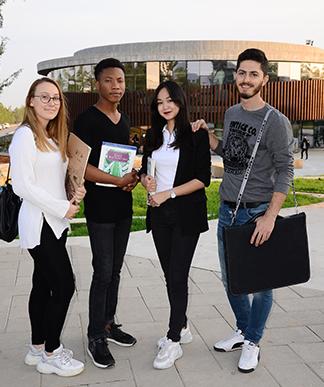


About the Program
The main objective of BA in International Relations program is to provide students with the knowledge and skills necessary to understand and analyze international politics. The program consists of compulsory and elective courses that seek to help students learn about both empirical and theoretical aspects of the academic field of international relations. The changing dynamics of international relations are interpreted from a multi-dimensional and up-to-date perspective in courses such as International Organizations, Comparative Politics, Global Political Economy, International Security and International Dispute Settlement. The program also includes courses that seek to train students about academic research methods and ethics. The curriculum is regularly updated to incorporate courses on recent developments in international relations. The courses that are offered involve in-depth analysis of both national and global crises and other current issues as well.
Accreditations
International Relations Program has certified its quality of education with the Foundation for International Business Administration Accreditation (FIBAA), by being accredited from the 17th September 2018.
Education Opportunities
The program is supported by courses on International Organizations, Comparative Politics, International Security and the Theory of International Relations. In the fourth year, students study the solution of problems and unsolved conflicts in current international systems, by attending courses on International Conflicts, Turkish Foreign Policy and Seminars. Aiming to improve its students’ ability to provide analytical knowledge, the International Relations Program studies the changing systems of international relations, through research topics and collective work groups. The program employs many researchers and foreign policy experts to help students follow recent and national matters. It holds global and national conferences and workshops titled ‘Diplomacy Days’. A Social and Strategic Politics Research Center has been founded in order to centralize the academic studies carried out in the program.

Career Areas
BA in International Relations program provides an education that consists of courses concerning the fundamental areas of the academic discipline of International Relations. The department aims to improve students’ ability to do knowledge-based analysis of international relations. The undergraduate program encourages students to do collective research through study groups. The program includes many compulsory and elective courses that are taught by researchers and foreign policy experts.
Double Major Programs are offered with the following undergraduate programs: Special Education Teaching (Turkish), Psychology (English), Architecture (English), Law (Turkish), International Law (English), Economics (English), Business Administration (English), Accounting and Finance (English), Journalism (English), Public Relations and Advertising (English), Tourism and Hotel Management (English), and also with Public Relations and Advertising (English) associate degree program.
Contact
Faculty of Economics and Administrative Sciences
Education and Graduate Sciences Center, GE 203
Tel: +90 392 671 1111 Extension: 2201
Faculty E-mail: secretary-fes@ciu.edu.tr
Head of Department: Assoc. Prof. Dr. Sertaç SONAN
Head of Department E-mail: ssonan@ciu.edu.tr
Compulsory Courses
First Semester
MICROECONOMICS
Course code
ECON101Credit
3Theoretical
3Practical
0Ects
6READING AND WRITING SKILLS-I
Course code
ENGL141Credit
3Theoretical
2Practical
2Ects
4INTRODUCTION TO POLITICAL SCIENCE
Course code
INRE101Credit
3Theoretical
3Practical
3Ects
6INFORMATION TECHNOLOGY
Course code
ITEC101Credit
3Theoretical
2Practical
2Ects
6SOCIOLOGY
Course code
SOCY101Credit
3Theoretical
2Practical
0Ects
6TURKISH LANGUAGE
Course code
TREG100Credit
0Theoretical
2Practical
0Ects
2TURKISH
Course code
TURK100Credit
0Theoretical
2Practical
0Ects
2Second Semester
MACROECONOMICS
Course code
ECON102Credit
3Theoretical
3Practical
0Ects
6READING AND WRITING SKILLS-II
Course code
ENGL142Credit
3Theoretical
2Practical
2Ects
4HISTORY OF CIVILIZATION
Course code
HIST100Credit
0Theoretical
2Practical
0Ects
2INTRODUCTION TO WORLD POLITICS
Course code
INRE104Credit
3Theoretical
3Practical
3Ects
6INFORMATION TECHNOLOGY II
Course code
ITEC102Credit
3Theoretical
2Practical
2Ects
6PSYCHOLOGY
Course code
PSYC110Credit
3Theoretical
3Practical
0Ects
6MODERN TURKISH HISTORY
Course code
TARH100Credit
0Theoretical
2Practical
0Ects
2Third Semester
HISTORY OF INTERNATIONAL RELATIONS-I
Course code
INRE201Credit
3Theoretical
3Practical
3Ects
6INTERNATIONAL RELATIONS THEORY-I
Course code
INRE209Credit
3Theoretical
3Practical
3Ects
6HISTORY OF POLITICAL THOUGHT-I
Course code
INRE211Credit
3Theoretical
3Practical
3Ects
6INTRODUCTION TO PHILOSOPHY
Course code
PHIL102Credit
3Theoretical
3Practical
0Ects
6STATISTICS
Course code
STAT203Credit
3Theoretical
3Practical
0Ects
6Fourth Semester
RESEARCH METHODS FOR SOCIAL SCIENCES
Course code
EASC470Credit
3Theoretical
3Practical
0Ects
6PRINCIPLES OF LAW
Course code
ILAW232Credit
3Theoretical
3Practical
3Ects
6HISTORY OF INTERNATIONAL RELATIONS-II
Course code
INRE202Credit
3Theoretical
3Practical
3Ects
6INTERNATIONAL RELATIONS THEORY-II
Course code
INRE210Credit
3Theoretical
3Practical
3Ects
6HISTORY OF POLITICAL THOUGHT-II
Course code
INRE212Credit
3Theoretical
3Practical
3Ects
6Fifth Semester
INTERNATIONAL LAW-I
Course code
ILAW331Credit
3Theoretical
3Practical
3Ects
6COMPARATIVE POLITICS-I
Course code
INRE321Credit
3Theoretical
3Practical
3Ects
6INTERNATIONAL ORGANIZATIONS
Course code
INRE341Credit
3Theoretical
3Practical
3Ects
6AREA ELECTIVE
Course code
INREXX1Credit
3Theoretical
3Practical
0Ects
6UNIVERSITY ELECTIVE
Course code
UNIEXX1Credit
3Theoretical
3Practical
0Ects
6Sixth Semester
GLOBAL POLITICAL ECONOMY
Course code
INRE312Credit
3Theoretical
3Practical
3Ects
6COMPARATIVE POLITICS-II
Course code
INRE322Credit
3Theoretical
3Practical
3Ects
6INTERNATIONAL SECURITY
Course code
INRE344Credit
3Theoretical
3Practical
3Ects
6AREA ELECTIVE
Course code
INREXX2Credit
3Theoretical
3Practical
0Ects
6UNIVERSITY ELECTIVE
Course code
UNIEXX2Credit
3Theoretical
3Practical
0Ects
6Seventh Semester
FREE ELECTIVE
Course code
FREEXX1Credit
3Theoretical
3Practical
0Ects
6FOREIGN POLICY ANALYSIS
Course code
INRE401Credit
3Theoretical
3Practical
3Ects
6CONFLICT RESOLUTION
Course code
INRE411Credit
3Theoretical
3Practical
0Ects
6AREA ELECTIVE
Course code
INREXX3Credit
3Theoretical
3Practical
0Ects
6AREA ELECTIVE
Course code
INREXX4Credit
3Theoretical
3Practical
0Ects
6Eighth Semester
ETHICS AND SOCIAL RESPONSIBILITY
Course code
EASC420Credit
3Theoretical
3Practical
3Ects
6FREE ELECTIVE
Course code
FREEXX2Credit
3Theoretical
3Practical
0Ects
6GRADUATION PROJECT
Course code
INRE400Credit
3Theoretical
3Practical
0Ects
6AREA ELECTIVE
Course code
INREXX5Credit
3Theoretical
3Practical
0Ects
6AREA ELECTIVE
Course code
INREXX6Credit
3Theoretical
3Practical
0Ects
6Elective Courses
ISSUES IN GLOBALIZATION
Course code
INRE412Credit
3Theoretical
3Practical
3Ects
6US FOREIGN POLICY
Course code
INRE422Credit
3Theoretical
3Practical
3Ects
6AFRICAN STUDIES
Course code
INRE447Credit
3Theoretical
3Practical
3Ects
6HISTORY OF POLITICAL IDEOLOGIES
Course code
INRE334Credit
3Theoretical
3Practical
0Ects
6POLITICS IN BALKANS
Course code
INRE440Credit
3Theoretical
0Practical
0Ects
6POLITICS IN CENTRAL ASIA AND CAUCASUS
Course code
INRE421Credit
3Theoretical
3Practical
3Ects
6ISSUES IN EURO - MED POLITICS
Course code
INRE436Credit
3Theoretical
3Practical
3Ects
6POLITICS OF CYPRUS
Course code
INRE419Credit
3Theoretical
3Practical
3Ects
CRITICAL SECURITY STUDIES
Course code
INRE428Credit
3Theoretical
3Practical
3Ects
6HUMAN RIGHTS
Course code
INRE431Credit
3Theoretical
3Practical
3Ects
6TURKISH FOREIGN POLICY
Course code
INRE444Credit
3Theoretical
3Practical
0Ects
6MIDDLE EAST POLITICS
Course code
INRE343Credit
3Theoretical
3Practical
3Ects
6ISSUES IN INTERNATIONAL RELATIONS
Course code
INRE446Credit
3Theoretical
3Practical
3Ects
6EUROPEAN INTEGRATION
Course code
INRE441Credit
3Theoretical
3Practical
0Ects
5EU SOCIAL POLICY
Course code
INR442Credit
3Theoretical
3Practical
0Ects
6MEDIA AND INTERNATIONAL CONFLICT
Course code
INRE456Credit
3Theoretical
3Practical
3Ects
6MANAGING SOCIAL RESPONSIBILITY PROJECTS
Course code
BUSN437Credit
3Theoretical
3Practical
0Ects
6CURRENT WORLD EVENTS
Course code
INR418Credit
3Theoretical
3Practical
0Ects
STATISTICAL APPLICATIONS FOR SOCIAL SCIENCES
Course code
STAT461Credit
3Theoretical
3Practical
0Ects
5INTERNATIONAL ECONOMICS
Course code
BUSN423Credit
3Theoretical
3Practical
0Ects
5KNOWLEDGE MANAGEMENT
Course code
BUSN410Credit
3Theoretical
3Practical
0Ects
6MANAGEMENT SCIENCE
Course code
BUSN321Credit
3Theoretical
3Practical
0Ects
6CREATIVITY AND INNOVATION
Course code
BUSN236Credit
3Theoretical
3Practical
0Ects
6MARKETING MANAGEMENT
Course code
MRKT116Credit
3Theoretical
3Practical
0Ects
7INTERNATIONAL MARKETING
Course code
BUSN484Credit
3Theoretical
3Practical
0Ects
6SMALL BUSINESS MANAGEMENT
Course code
BUSN416Credit
3Theoretical
3Practical
0Ects
6MANAGERIAL ECONOMICS
Course code
ECON465Credit
3Theoretical
3Practical
0Ects
6INTERNATIONAL BUSINESS MANAGEMENT
Course code
BUSN471Credit
3Theoretical
3Practical
0Ects
CONSUMER BEHAVIOR
Course code
MRKT217Credit
3Theoretical
3Practical
0Ects
6SOCIAL POLICY
Course code
BUSN210Credit
3Theoretical
3Practical
0Ects
6CREATIVE DIGITAL MEDIA PRODUCTION
Course code
DMMA204Credit
3Theoretical
3Practical
0Ects
6PROJECT MANAGEMENT
Course code
BUSN441Credit
3Theoretical
3Practical
0Ects
6MANAGERIAL ECONOMICS
Course code
BUSN465Credit
3Theoretical
3Practical
0Ects
7ORGANIZATION THEORY
Course code
BUSN361Credit
3Theoretical
3Practical
0Ects
MONEY AND BANKING
Course code
BUSN332Credit
3Theoretical
3Practical
0Ects
6BUSINESS POLICY AND STRATEGIC MANAGEMENT
Course code
BUSN487Credit
3Theoretical
3Practical
0Ects
6FUNDAMENTALS OF ECONOMICS
Course code
ECON110Credit
3Theoretical
3Practical
0Ects
5E-COMMERCE
Course code
BUSN428Credit
3Theoretical
3Practical
0Ects
POLITICS IN CENTRAL ASIA AND CAUCASUS
Course code
INRE421Credit
3Theoretical
3Practical
3Ects
6CRITICAL THINKING FOR MANAGERS
Course code
BUSN385Credit
3Theoretical
3Practical
0Ects
6TR Applicants
TR Students who are successful in the exams conducted by the Higher Education Council Student Selection and Placement Center (ÖSYM) and are entitled to enroll in our university in line with their preferences can complete the registration process with the necessary documents for registration from our Registration and Liaison Offices throughout Turkey or from the Marketing Directorate on campus.
Click for detailed admission requirements information.
TRNC Applicants
TRNC citizens and TR citizen candidate students who have completed their entire high school education in TRNC. They are placed in undergraduate programs in line with their success in the CIU Student Placement and Scholarship Ranking Exam and the programs they prefer.
Students who are successful in the exam can register from the TRNC Marketing Office.
Applicants can directly apply online to our undergraduate programs using the application portal. Please fill in your details correctly and upload all the required documents listed on the last page of the application form.
Required documents;
- Completed application form,
- Higher/Secondary Certificate or equivalents (e.g. O/A’Level, WAEC/NECO),
- Evidence of English Language competence: TOEFL (65 IBT) or IELTS (5.5). Students without these documents will take the CIU English proficiency exam on campus following arrival,
- Scanned copy of international passport/birth certificate,
- Fully completed and signed CIU Rules and Regulations document (which can be downloaded during the online application).
Cyprus International University provides academic scholarships for its students as an incentive for success, with most students benefiting from 50%, 75% or 100% scholarships or discounted tuition fees. Click for more information.
Tuition Fees are determined at the beginning of each academic year. Candidate students who are entitled to enroll in CIU can learn their fees in line with the Tuition Fee Calculation system.